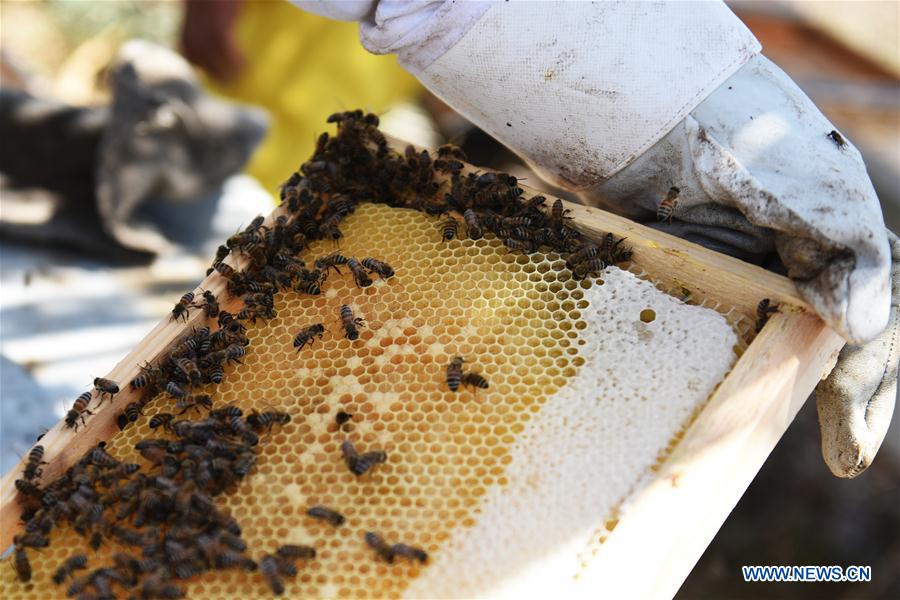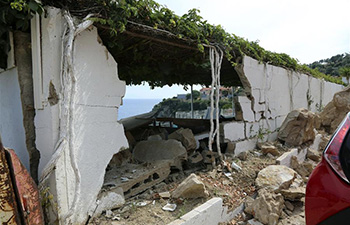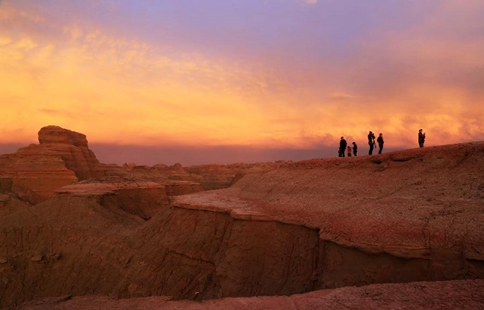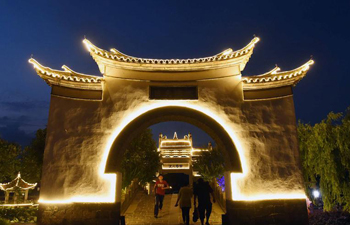A worker holds a beehive as he works at Mohammed Hagras' farm located in Beheira governorate, Egypt, on June 4, 2017. Being a successful petroleum engineer did not block the dreams of 32-year-old Egyptian Mohammed Hagras to be a distinguished beekeeper. The man, who works for a well-known petroleum company, decided to start beekeeping business at his farm as he believes that honey and bee production is among the safest investments in Egypt. (Xinhua/Zhao Dingzhe)
by Ahmed Shafiq
BEHEIRA, Egypt, June 12 (Xinhua) -- Being a successful petroleum engineer did not block the dreams of 32-year-old Egyptian Mohammed Hagras to be a distinguished beekeeper.
The man, who works for a well-known petroleum company, decided to start beekeeping business at his farm as he believes that honey and bee production is among the safest investments in the most populous Arab country.
His first introduction to beekeeping was at the age of six when he used to help his father at their farm.
"It was love at first sight when I first stepped into our bee farm as it was my window to see nature. From that moment, I wanted to be a beekeeper and enlarge my father's beekeeping business," Hagras said, proudly smiling.
In his farm located in Beheira governorate in Egypt's Delta, Hagras, who is originally from Delta governorate of Minufiya, was carefully watching his workers collecting ripe honey from his 500 beehives, announcing the beginning of the heavy honey collection season which starts in June.
"I started to take care of my father's business in 2014," Hagras said, wearing his beekeeping protective suit. "I started with tens of beehives. Now I have 500."
Before starting his beekeeping career, Hagras studied the project carefully and gained enough information and knowledge that would help him run the business successfully.
"I found out that beekeeping business is a successful industry that can make good money," the man said as he peeled off wax cells to get fresh golden honey. "I also take advantage of living in a rural community where villagers plant seasonal crops that can be good food for the bees."
In a very short period of time, Hagras managed to create a name in the Egyptian honey market and he now runs a private company which exports honey and bee products to other countries.
"My beehives produce some 5,000 tons of natural honey that I sell locally. I also export other products such as pollen, wax, bee venom and queen food to neighboring Arab countries," the man said.
Hagras said he is now working jointly with other beekeepers to put Egypt back on track as a leading country in the honey and bee industry.
The man said Egypt is one of the oldest countries in beekeeping field, adding that the Pharaonic drawings and paintings on tombs and other monuments in Egypt showed how beekeeping was practised here.
The Ancient Egyptians kept bees from about 2400 B.C. when the earliest drawings of beekeeping and honey preparation were seen in Egyptian temples, he added.
These drawings showed that beekeeping in ancient Egypt was characterized by using cylindrical hives, migratory beekeeping using rafts down the Nile River and production of huge amounts of honey.
Speaking about the current situation of beekeeping in Egypt, Hagras said the North African country is considered the most important country in beekeeping sector in the Middle East with more than three million beehives.
According to official statistics, Egypt exported honey and bee products worth up to 135 million U.S. dollars, or 2.4 billion Egyptian pounds in 2016, a very large number compared to the previous two years.
"Bee and honey industry is a national wealth that should be supported by the government," the engineer said, adding that the government could earn billions of foreign currency if it fully supports the sector.
The high prices of beekeeping materials and equipment obstruct or lower the development of the industry, which requires a governmental intervention to financially and technically back beekeepers, he said.
"One of the most serious problems facing the Egyptian beekeeper is the lack of the original medications for the diseases facing the beekeeping sector. This opens the door to the mafia of fake, local and smuggled medicines," Hagras said while pouring honey in glass jars.
The man expects that a new system overseen by the government will make Egypt a pioneering country in the honey industry since Egypt is the only country capable of producing bees and queens throughout the year for the vast agricultural areas it has.
"All of these elements can make Egypt a qualified country to be a global station for beekeeping. The global marketing of beekeeping sector in Egypt will be a good investment that will pump millions of dollars and provide many jobs for thousands of Egyptian youths," said Hagras.


















